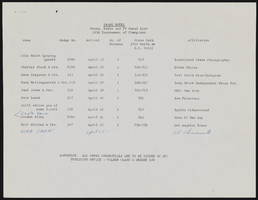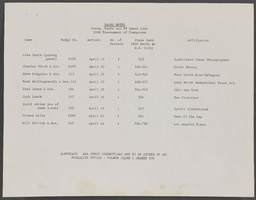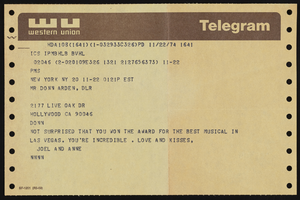Search the Special Collections and Archives Portal
Search Results

Transcript of interview with Arlene Blut by Barbara Tabach, May 28, 2015
Date
Archival Collection
Description
In this interview, Arlene discusses her family and important friendships; her relations with and impressions of the disparate Las Vegas Jewish communities; the meaningful ways her Jewish relationships in Duluth, Winnipeg, and Las Vegas intertwine; her theatrical, professional, and philanthropic work; the reasons she and Jerry became active Zionists; and their support for Israeli causes. Her liberal sprinkling of Yiddish terms enriches her speech as it exemplifies her deep cultural attachment to and identification with her Jewish heritage, despite the fact that her wide and diverse circle of friends remains predominantly non-Jewish.
Actor, director, friend, mother, producer, wife, and volunteer extraordinaire Arlene Piekoff (now Blut) arrived in Las Vegas in 1971 with two young children and husband, Michael Peikoff, who was opening a surgical practice. Arlene was born and raised in Duluth, Minnesota, where she attended a Conservative Jewish temple but had mostly non-Jewish friends. She met Michael at the University of Minnesota, and they married before he began medical school in Winnipeg, Manitoba, Canada. Arlene and Michael followed his residencies and fellowships to California, Michigan, and Manitoba before they came to Las Vegas Through her brother in law and Ayn Rand?s intellectual heir, Leonard Peikoff, Arlene was exposed to Ayn Rand Objectivism, a philosophy that still influences her political outlook. After her 1975 divorce she began working at the Jockey Club; founded the Meadows Playhouse, Las Vegas?s first professional black box theater; and started Renta Yenta, the valley?s first full-service event planning business. In 1980 she married tax attorney Jerry Blut in a Renta-Yenta-produced, Fiddler-on-the-Roof-themed wedding at Paul Anka's Jubilation Restaurant.
Text

Transcript of an interview with Gertrude Rudiak, Richard Rudiak, and Dani Ramage by Barbara Tabach, December 30, 2015
Date
Archival Collection
Description
On December 30, 2015, a few months after her 100th birthday celebration, Gertrude Rudiak, with the help of her son Richard Rudiak and granddaughter Dani Ramage, reminisced about living in Las Vegas since 1946, nearly eighty years. They explore the ancestral roots of Gertrude (n?e Rightman) and of her deceased husband George Rudiak. Their courtship and marriage at the brink of World War II and George?s enlistment in the US Army Corps is what brought the couple to Las Vegas and the gunnery school which is now Nellis Air Force Base. After his tour of duty, George settled into a law practice where he specialized in quickie-divorces, but also carved out a reputation supporting civil rights and working for legislation to eliminate working and living discrimination of blacks in Nevada. Gertrude was an active member of Las Vegas. She played the pipe organ, hosted large Seders at Passover and managed the Rudiak household that grew to include five children. Over her long life, Gertrude embraced many positions on community boards, including being Temple Beth Sholom?s first female board member. She was also a teacher in both secular and Jewish education. Her efforts have been recognized by the Jewish National Fund, the United Jewish Appeal, and the Anti-Defamation League. Additionally, Mayor Carolyn Goodman presented Gertrude with the distinguished honor of a key to the city of Las Vegas in 2014. The city declared August 2, Gertrude's birthday, Gertrude Rudiak Day in recognition of her long-standing commitment to Las Vegas.
Text

Transcript of interview with Bobby Morris by Barbara Tabach, March 24, 2016
Date
Archival Collection
Description
In this interview, Morris reflects upon his career and the wide range of influential artists he has worked with, as a drummer, musical director and talent manager. Stories include playing with Louis Prima, live and on albums; serving as Elvis? musical director; filling in for Frank Sinatra?s drummer; entertaining Howard Hughes; and playing at President John F. Kennedy?s inauguration, to name a few. He also talks about his agency, attributing its success to the strong relationships he built with casino management.
Text

Transcript of interview with David Dahan by Barbara Tabach, May 26, 2016
Date
Archival Collection
Description
The fascinating life of David Dahan began in Casablanca, Morocco where he was born to Mathilde and Isaac Dahan in 1957. After a hasty departure in 1970 the family came to America and to Las Vegas. Isaac became an administrator for Yellow Cab and Mathilde was a server at the Stardust Hotel/Casino. David evokes a tale of growing up a teenager in a strange culture and then heading out on a solo adventure to learn about the world. By 1977, he fell in love and married an engaging Israeli nurse named Yaffa (1954-2007). Her legacy is the Yaffa Dahan Nursing Education Fund established to assist outstanding PhD nursing students in their dissertation research. Leadership and the energy to always say yes are among David?s many characteristics. He has served on numerous local boards, such as: Nevada Restaurant Association, North Vista Hospital, Touro University, Las Ventanas, Henderson Chamber of Commerce, and the Nevada Law Foundation. He has been the recipient of many awards and acknowledgments for his tireless efforts throughout Las Vegas. Among those is being named the 2005 Person of Influence by In Business Las Vegas. From 1997 ? 1999, he served as President of the Jewish Federation during which time he led a trip to Russia. He is past chair of AIPAC (American Israel Public Affairs) Committee. In 2007, David was honored as Mensch of the Year at Congregation Ner Tamid. In this interview he recalls his family?s escape from Morocco, learning to adjust to life in Las Vegas and his early jobs in the restaurant business. With his roots firmly planted in Las Vegas, David has built strong relationships within the Jewish and general Las Vegas communities. David is the Chief Executive Officer of Orgill/Singer Insurance. His life experiences have fueled passions for his faith, cooking, photography, poetry and his daughters, Shana and Michelle.
Text

Transcript of interview with Adele Baratz by Steve McClenachan, March 3-4, 1979
Date
Archival Collection
Description
Interview with Adele Baratz by Steve McClenachan on March 3 and 4, 1979. In this interview, Baratz talks about growing up in Las Vegas and her her schooling. She graduated from Las Vegas High School in 1944, and discusses the rationing that took place during World War II. She went to Maryland for nursing school and returned to Las Vegas in 1947. She describes some of the hotels and casinos, and tells the story of her father trading property for an automobile in 1935. She also recalls the building of Hoover Dam, swimming in local pools, and going to Mount Charleston in the winter. The interviewer asks her about travel between Las Vegas and California and the impact of Atlantic City on Las Vegas tourism. Baratz then talks about her nursing career and starting a re-certification program in 1974 and the different hospitals in the area.
Text
Transcript of interview with Hank Greenspun by Perry Kaufman, 1975
Date
Archival Collection
Description
Hank Greenspun discusses coming to Las Vegas in the 1940s, his journalistic endeavors, and some of the politics that affected him.
No release form is on file for this interview. The interview is accessible onsite only, and researchers must seek permission from the interviewee or heirs for quotation, reproduction, or publication. Please contact special.collections@unlv.edu for further information.
Text
James, Virginia, 1932-
Virginia Joyce Mooney was a dancer who performed in the Sands Hotel and Casino and the Tropicana Hotel and Casino in Las Vegas, Nevada. She changed her name to Virginia James when she began performing at the Sands.
Person



